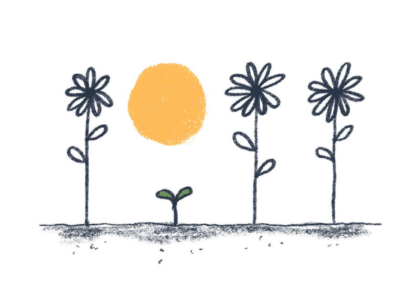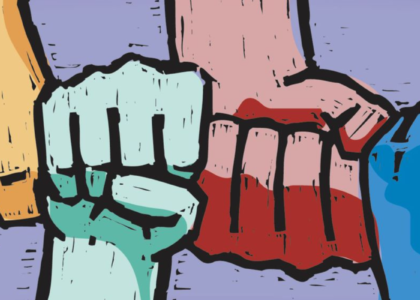“If you’re going to read [the Qur’an] for hierarchy, that is more of a reflection on you than it is on the text or on God.”
Amy is joined by Dr. Zahra Ayubi to discuss her book Gendered Morality: Classical Islamic Ethics of the Self, Family and Society and begin this season’s exploration of gender relations in the Muslim world.
Our Guest
Dr. Zahra Ayubi
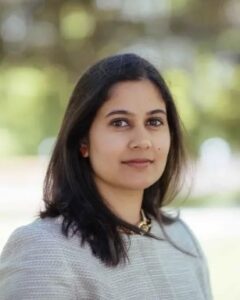
Dr. Zahra Ayubi is a scholar of gender in pre-modern and contemporary Islamic ethics. She specializes in feminist philosophy approaches to the Muslim intellectual tradition. Her work includes a serious look at masculinity and gendered childhood, in addition to studying more traditional gender topics such as constructs of femininity, women’s experiences, marriage, divorce, sexuality, and feminism. She has published on gendered concepts of ethics, justice, and religious authority, and on Muslim feminist thought and American Muslim women’s experiences. Her book, Gendered Morality: Classical Islamic Ethics of the Self, Family and Society, was published by Columbia University Press in 2019. In it, Ayubi calls for a philosophical turn in the study of gender and Islam based on resources for gender equality that are unlocked by feminist engagement with the Islamic ethical tradition.
She’s currently taking that philosophical turn in her second book project, Women as Humans: Life, Death, and Gendered Being in Islamic Medical Ethics, which was supported by a three-year grant from the Greenwall Foundation’s Faculty Scholars Program. The project is a textual and ethnographic study of gender and gendered experiences in Muslim biomedical ethics.
Zahra Ayubi is an associate professor of religion at Dartmouth College, where she started in 2015 upon completion of her PhD in religious studies from the University of North Carolina at Chapel Hill. She is the current president of the Society for the Study of Muslim Ethics.
The Discussion
Amy Allebest: The next few episodes of our season on global patriarchy will focus on the Near East, Middle East, and North Africa. And one critical underpinning of gender relations in this part of the world is Islam. I looked for a long time to find a book that would give us a foundational knowledge of the religion of Islam, and so when I found a book called Gendered Morality: Classical Islamic Ethics of the Self, Family and Society, I was thrilled and I read the book and it was fantastic. I learned so much, and I’m so excited to welcome the author of this book, Dartmouth professor Dr. Zahra Ayubi to our podcast today. Welcome, Zahra!
Zahra Ayubi: Hi, thanks for having me!
AA: I’ll just start by reading your professional bio and then I’ll ask you to introduce yourself a little bit more personally in a minute. Dr. Zahra Ayubi is a scholar of gender in pre-modern and contemporary Islamic ethics. She specializes in feminist philosophy approaches to the Muslim intellectual tradition. Her work includes a serious look at masculinity and gendered childhood, in addition to studying more traditional gender topics such as constructs of femininity, women’s experiences, marriage, divorce, sexuality, and feminism. She has published on gendered concepts of ethics, justice, and religious authority, and on Muslim feminist thought and American Muslim women’s experiences.
Her book, Gendered Morality: Classical Islamic Ethics of the Self, Family and Society, was published by Columbia University Press in 2019. In it, Ayubi calls for a philosophical turn in the study of gender and Islam based on resources for gender equality that are unlocked by feminist engagement with the Islamic ethical tradition. She’s currently taking that philosophical turn in her second book project, Women as Humans: Life, Death, and Gendered Being in Islamic Medical Ethics, which was supported by a three-year grant from the Greenwall Foundation’s Faculty Scholars Program. The project is a textual and ethnographic study of gender and gendered experiences in Muslim biomedical ethics. Zahra Ayubi is an associate professor of religion at Dartmouth College, where she started in 2015 upon completion of her PhD in religious studies from the University of North Carolina at Chapel Hill. She is the current president of the Society for the Study of Muslim Ethics. I mean, really so impressive and you just bring such a rich background to the work you do. And I’m so excited to have you speak today. But first, if you can tell us a little bit about you personally! Where you’re from and some of the things that make you, you and what you bring to the work that you do.
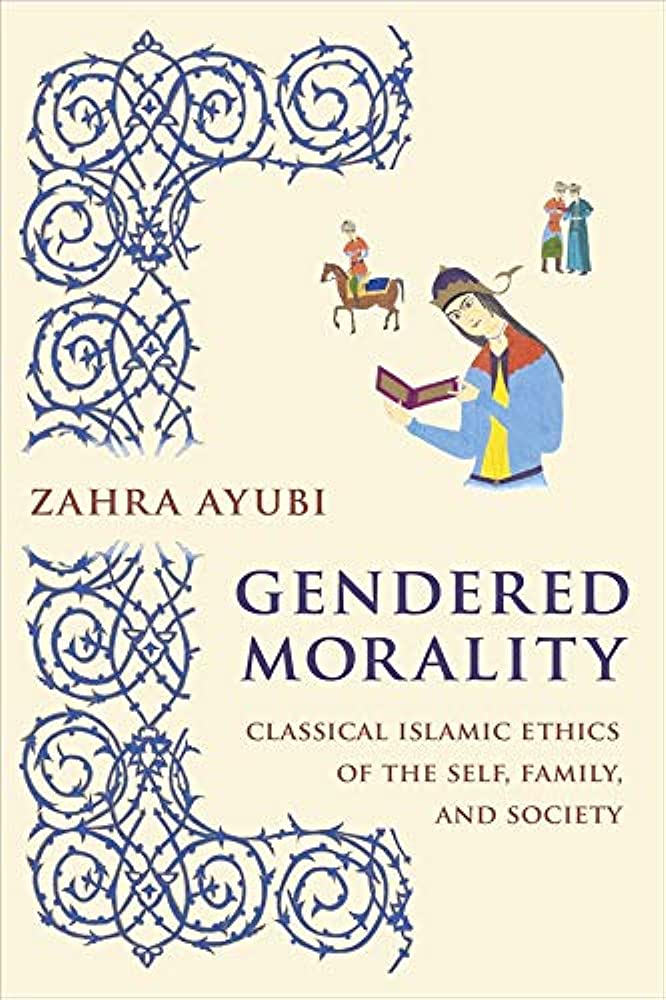
ZA: Sure! So I am from Boston and I grew up in Boston, and I was always sort of attracted to studying and learning about gender in Islam. I don’t know exactly where that comes from except for perhaps an exploration of my own identity. So I identify as Muslim, and it was that which led me to taking courses in college on gender in Islam. And I had simultaneously also been really interested in scholarship in general and the academy. I mean, my family sort of jokes and recalls this moment where I saw an advertisement for an exhibition somewhere in Boston when I was a kid of these pre-modern Qur’an manuscripts. And it may have been a college museum or a museum downtown, and when I saw that, my eyes sort of widened and I said “That. I want to be that, and I want to study this.” And I was really drawn to, I guess, Muslim history just because of the beauty of what I was exposed to, the beauty of art and architecture and the cultural experiences that I had. And though studying it was always an interest of mine, the gender piece I think was the more substantive part of studying Islam that sort of came about as I was growing up and felt like it’s an area that I want to learn more about, and it just sort of grew from there. I didn’t know, you know, I’m still interested in the arts and Islamic art and architecture, but it was really these larger questions about being and belonging, and gendered being and belonging, that sort of drove my intellectual curiosity. And right after college, I applied to PhD programs and got in and thought, “okay, this is meant to be.” And it just sort of took off from there. And a lot of what I ended up studying in my PhD program was grounded in the beauty of the tradition and culture and so on, but also it equipped me with the critical thinking skills, and the questions, and approaches and frameworks that I employ now, several years later. And so that’s where I’m coming from.
AA: Fantastic. Yeah, thanks for sharing that. I’d love to start our conversation really at a basic level, just assuming that you’re talking to a listener who doesn’t know much about Islam. Could you acquaint us with the history of Islam and then specifically talk about the gender dynamics that are present?
ZA: Yeah, sure. I like to talk about the emergence of Islam actually in the context of what was before it. So, Muslims believe that Islam and the prophet Mohammed emerged in a context in Arabia in which monotheism was present, as were various kinds of pre-Islamic pagan beliefs and rituals, and some of that was polytheistic. But Muslims believe that Mohammed was born in Arabia in a line of succession of the prophets who are Abrahamic in nature and in lineage.
AA: Can I just ask you to remind us what year Mohammed either was born or received his visions and became a prophet?
ZA: Yes, he was born in 570 and received revelation or, you know, believed to have received revelation from the archangel Gabriel in around 610. So really Late Antiquity and near the tail end of the Byzantine Empire and Sasanian Empires to the northeast and northwest. At the time in Late Antiquity in Arabia, the idea was that there was a lot of unethical belief in practice taking place and that Mohammed’s role was to remind humanity once again about God. And Muslims believe that there is only one God and is sort of a unified God. You know, Jews and Christians and everybody really all have the same God. And so Mohammed’s role was to be this final reminder to humanity of God’s unity, singleness, uniqueness, oneness, and that everyone is accountable for their actions and behaviors ultimately to God. And so initially, Mohammed was rejected in his role because he was financially threatening to the people of Mecca who fiscally benefited from pilgrims from all over the Silk Road and Arabia; tribes and clans would visit a shrine in Mecca called the Kaaba, which was believed to be built by Abraham and his son Ishmael as a marker of monotheism, but then become sort of this catch-all for all of the deities of the people who lived and visited Mecca.
Mohammed’s message, and this connects to my own work in terms of ethics work, was really focused on the ethics of people’s practices and beliefs. Around how they treat each other and how they treat nature and animals and approach life, and think about what they’re doing in the context of accountability to God in the hereafter. And it’s in that tradition that Mohammed eventually won the hearts and minds of people, and there’s obviously a lot more nuance and historical narrative to that, but essentially one major takeaway from the founding story of Islam is that it’s deeply rooted in this notion of remembering God because one is ultimately accountable for one’s behaviors. And so acting justly and acting rightly is an important part of submitting to God’s will and being a believer.
Today we’re talking about nearly 2 billion Muslims in the world, and so some scholars like to think of that as also meaning there’s 2 billion ways of being Muslim. And so, the life of the Qur’an and its role in people’s lives is part of that variance and nuance in terms of how people identify with it or don’t identify with it, and what role it might or might not play in people’s lives, how important it might be, whether or not they have the literacy to read it, or have the educational background to understand it or interpret it or whatever. Because even if many Muslims, or even most Muslims are taught to recite certain basic verses for purposes of ritual, and you know, by and large it is a text that is less accessible to people who may not know Arabic apart from memorizing to be able to recite, outside of translation, at least. And so that gets into questions of authority and who has the right to interpret and so on.
AA: Well that was my next question, and maybe I’ll make this a two-part question. Specifically in terms of gender, I’m wondering if 1) if you can tell us a little bit about what the Qur’an says about gender. I recall when I read some passages that there were some verses that seem to indicate egalitarian values, especially in contrast to the culture at the time. And so if you can share some verses that indicate egalitarian values, and then maybe some verses that don’t, or at least are interpreted that way. And then 2) tell us who does have the authority to interpret the verses. Because my background is in biblical scholarship and study, and there is, just like you described with the Qur’an and my religious tradition, a wide variety of interpretations and it matters a lot when you’re looking at lots of different issues. But let’s talk about gender specifically.
…acting justly and acting rightly is an important part of submitting to God’s will and being a believer.
ZA: So, gender in the Qur’an is a very complex and multi-layered question, because by and large the Qur’an is a fairly egalitarian text. And lots of, I mean, apologetics will say, “well, it’s the first Abrahamic text that actually spoke to women and addressed them.” And, I mean, yes that’s true. But you know, we have to qualify that of course. It’s a proponent of equality, fairness, doing right by those who are oppressed, those who are less fortunate, orphans, widows in particular. And that is the general ethos of the text, is fairness and equality and accountability, and doing right by people who would otherwise have a very difficult lot in life. And so that general ethos is there and some of that is with respect to women. I mean, there’s a chapter on women and then there’s several verses on women.
And I say “on women” meaning different aspects of life, right? So there’s verses about witnessing, and there’s verses about widows, and there’s verses about inheritance, and so on and so forth. The text is very egalitarian in that way. The same thing goes for the question of enslavement, which is important also to think about when it comes to women because historically in Antiquity, a great percentage of women in the world were chattel and were enslaved. And so that is also a gendered question. You know, the Qur’an is not necessarily an abolitionist text. And we know that. But it is indeed a text that supports freeing of slaves, freeing of those who are in servitude and bondage. And the prophet Mohammed himself had freed as many people as he could, and things like that, right? So there’s certainly this understanding, it is a text that we have to read in its historical context when it comes to questions of gender and inclusivity. But at the same time, there are potentially double standards within the text, such as the question of testimony and witnessing and inheritance; you know, women were able to inherit according to the Qur’an, but sons were inheriting double, and things like that. So there is a double standard.
But the question is what that actually may have meant in that historical time period, and why is it? Of course that doesn’t necessarily settle a lot of contemporary feminist questions. If people are looking for answers to absolute egalitarianism from some of the verses that are very, very direct about things that have double standards, if one is looking for absolute equality from a text that emerged in a world in which absolute equality was not even a thing, then you’re going to be disappointed. Right? But if you’re looking at the text from the perspective of what it meant to people, what impact it had on people at the time, and projecting forward, what that ethos might look like today, then there’s room to play. There’s room to think about what are the possibilities of what that ethos actually could mean for contemporary questions. And so there’s one verse in particular that stands out that everybody knows by number, by chapter and verse, which is verse 4:34. Everyone knows that one, like you don’t know anything else about the Qur’an, but suddenly verse 4:34 and it’s the infamous verse, or notorious verse rather, in which the text is talking about how men are (depending on who you’re asking in terms of translation) the protectors, or somehow some people translate it as guardians, some people translate it as keepers of women and have a degree above them. And the question is: what is that degree of men over women? And a lot of people have assumed that that means that’s financial. Because there are other places in the Qur’an where it’s talking about creation, and men and women are created equal in God’s eyes. So in God’s effort in creation, and God has created all the atoms and the particles equally. And all the human beings are created from a single soul. And men and women are created from a single soul and in the same way. And so that equality in creation is really powerful and it sort of juts up this one verse which is saying suddenly that men have this degree over women. And a lot of people have interpreted that to mean it’s a financial description of time – or of any time, for that matter – in which men have a lot more capital and wealth than women. And sociologically, that’s true today too.
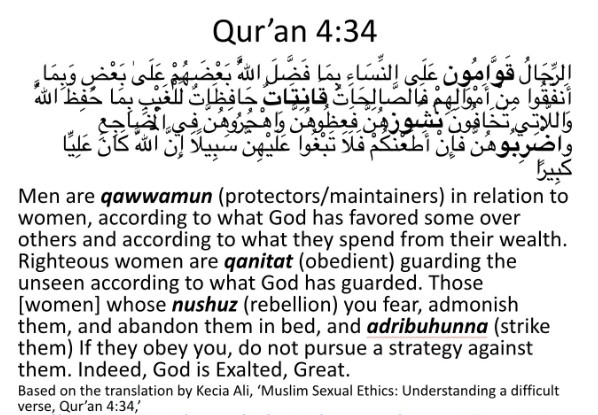
AA: More of a description rather than a prescription of how things should be.
ZA: Right, so some people will interpret it as a description and others will interpret it as a prescription. As perhaps people do of other verses on other topics. And so that is something that is up for debate. And of course the response to that is, well, what if women make more? Does that mean that they now have the degree over men? And I mean, the simple answer is yes. But the complicated answer is, do we not interpret that degree of men over women financially, and do we interpret it in other ways? Or do we in fact continue to interpret it as a financial description of the wealth distribution of the world? And perhaps if the conditions were different, does that verse mean something entirely different suddenly?
And so these are the kinds of debates that are coming up from this particular verse. But as I said, it stands sort of solo in the context of a broader Qur’anic ethos of egalitarianism, especially in creation. A lot of people will say that human beings are created equal in the eyes of God, but on earth matters are different. And so even though every human being is accountable in the same way for their own actions and morals, and everyone is owed respect and kindness and mercy and so on, that perhaps on earth it’s different. And of course there are plenty of verses that are talking about conditions on earth in which you’re supposed to show kindness and mercy, and fairness and justice, which are all attributes of God as well that human beings are supposed to learn from. So as I said, the Qur’an is complicated in that way. There’s the historical layers and then there’s the nitty gritty interpretation of particular verses in text that might bring about certain interpretations read in the context of others, they may not yield that same interpretation.
One of the foundational scholars of feminist readings of the Qur’an – or women-centered readings of the Qur’an, I should say – is a scholar named Amina Wadud, who argued that the ethos of the Qur’an is absolute egalitarianism and there are ways to interpret and understand specific verses that clarify the historical nature of the text, and that doesn’t necessarily reflect back on God’s intent per se, if you’re going to read it in a non-egalitarian fashion. If you’re going to read it for hierarchy, that is more of a reflection on you than it is on the text or on God. And so I think that she’s not alone in that interpretation. There’s numerous scholars who both agree with her but also expand on that similar approach, not necessarily on topics of gender. So the question of uniformity and approach is also there.
Your question about authority: who has authority to interpret? So, technically anyone. Anyone has the ability to read the text, especially now, right? When the text is so democratized and everyone has a copy of it on their shelf, and the printing press enabled that, and technology, and everyone has access to it on their phones if they want it, and so on. So it’s a very heavily accessible text. Now, whether or not accessibility translates to authority is a whole other question. And this is actually a really modern phenomenon of people actually opening the Qur’an for figuring out the answers to their particular conundrums, and going to specific relevant verses, and so on. Historically, there have been scholarly elite classes of scholars who have written exegesis, have spoken to people, have held audiences, have written in responses to queries that might have been written or orally delivered. And those scholars have by and large been men, not always, not exclusively, but have by and large been men. And, there are three major authoritative traditions that have overlapped, they’re not silos in and of themselves, where one is the people who are studying in a traditional seminary setting, not just Qur’an but also the intellectual tradition, the legal tradition that stems from the Qur’an and also stems from the prophet Mohammed’s sayings, which themselves are actually a whole other corpus of texts and writings that have been collected. And there’s a whole science on authenticating prophet Mohammed’s utterances and sayings and so on. So there’s that whole genre as well that we like to call hadith criticism. Hadith is the saying of the prophet Mohammed that was recorded after his death. And those sayings sometimes are consistent with things that are in the Qur’an, they illuminate what’s in the Qur’an, sometimes they have nothing to do with something that’s in the Qur’an but are additional knowledge or additional things that the prophet did or practiced. And so they also serve as authoritative texts. And so the scholars historically have studied the Qur’an and the hadith and created genres of Islamic legal thought and so on.
if one is looking for absolute equality from a text that emerged in a world in which absolute equality was not a thing, then you’re going to be disappointed
But there’s also another stream that I mentioned of authority, which is a more mystical, spiritually oriented stream of authority. Which, you know, some people might identify with Sufi traditions in which there is a teacher and lineages and orders of mystical groups, in which there is religious knowledge that’s being passed down in an authoritative manner. And sometimes that’s simply about spirituality and relationship to God, and isn’t necessarily gendered per se, although all of that can be gendered as well. But sometimes the knowledge that a student might ask a Sufi master, a Sufi sheik, might be related to gender in Qur’an or some other issue that is really relevant to one’s lifestyle and not just about spirituality, although the two are interconnected. And so there are questions and answers being passed back and forth that are authoritative in that way for people. And then there’s, of course, the authority that comes with informal study, and who is speaking for whom in that regard. A lot of times that’s very deeply gendered. I should have said also when I was talking more about the Qur’an, the idea that Muslims act according to the texts or that the texts are constantly guiding Muslims’ actions is a remnant of Orientalist thinking, which was sort of a cultural part of colonialism in which Orientalists had thought that if they studied the text of the Muslims, that they would understand Muslim psyche and Muslim thought, and then therefore they can be colonized. And that leads people to a lot of misunderstanding that if somebody wants to do something wrong or do something right, or do anything at all in their lives, that they’re going to the text to find out, or that the Qur’an somehow guides people directly, their actions… It may or may not be the case. And it’s like saying, “oh yes, now that I’ve studied the Bible I know everything there is to know about the United States.” It just doesn’t make sense, right? And there are so many pieces to our lives that interact with our religious lives that drive people to act the way that they do. And so that’s the case for Muslims as well.
And so, who has the authority? By and large, it is gendered, but there are women’s Sufi lineages that I mentioned earlier, there’s also women who have historically been the transmitters of the prophet Mohammed’s sayings in particular. The hadith literature is a very female-dominated science, actually, oddly enough because his wives and his female companions were really instrumental in recording what he was saying and so on. And so that becomes a really woman-oriented tradition in transmission and hadith scholars. And then the legal tradition is in fact very patriarchal and male-centered, but there were also women who were specialists in it. So there’s certainly that ability of women to have an opening, certainly in the contemporary period there’s both in very, very traditional as well as more progressive and egalitarian oriented modes of learning, there’s women who are studying the religious sciences and the Islamic texts and so on.
How much authority do they have in interpreting? Sure, they have authority. I guess the question is not always going to be who has authority, but rather how much of what people are interpreting is hierarchical and patriarchal? And there’s sort of a rehashing of patriarchal arguments as opposed to thinking about the tradition in egalitarian ways. And naturally, the more women that participate in the interpretive tradition, the more egalitarian the understandings and interpretations will be. But it’s certainly not always the case that women interpreters are supporting egalitarian interpretation.
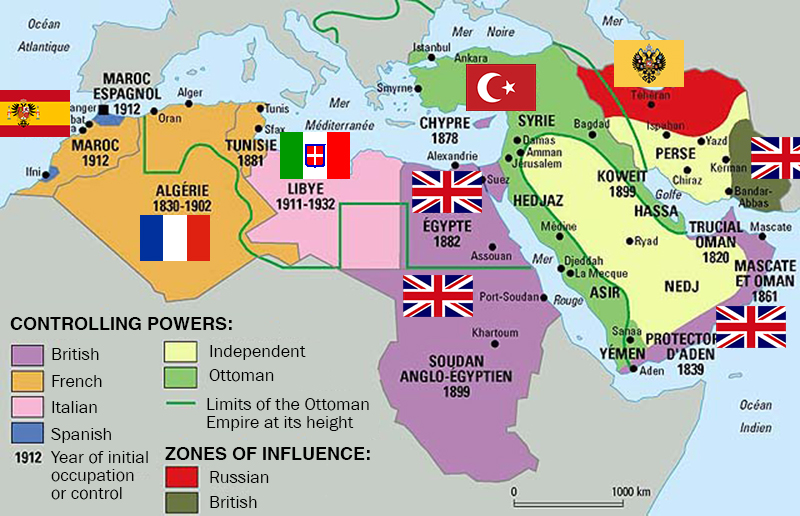
AA: As I’ve been listening to you, it’s really heartwarming in a way to feel such a kinship because this feels familiar to me, to be honest. I can tell, you know, Jewish and Christian and Muslim people are called “people of the book,” and I think we’re cousins and I guess feel a sense of kinship and solidarity in the way that you’re describing scripture and philosophy and the way it affects our lives.
So Zahra, I wish we could talk for a lot longer and dive deeply into some of the things that you talk about in your book, but I’m hoping listeners will just order the book and buy it. But I’d love to hear what you think is one of the most critical issues that we haven’t had a chance to talk about yet in our conversation.
ZA: Yeah, I think one of the most important things that I would want your listeners to take away would be recognizing the irrevocable impact of colonialism on Muslim beliefs and practices. Colonialism had an irrevocable impact on Muslim understanding, self-understanding, the way that they read their own texts, the way that they understand the role of their tradition. And particularly on understandings of gender and Islam, because so much of the colonial enterprise was driven by this idea that Muslim women must be saved by European men from Muslim men and their religion, which is backwards and oppressive and retrograde. And so that has stuck and been internalized so deeply. When anyone even says “Muslim woman” or talks about Muslim countries, it’s almost immediate, automatic that people assume they understand the oppressive nature of Islam, and the oppressive nature of Muslim men, and so on and so forth. And Muslims in turn have also internalized this characterization. One of the reasons why there is so much solidarity between scholars and people who are really intellectually inclined who focus on egalitarian interpretations of their religious tradition across Judaism, Christianity, and Islam And one of the reasons why there is so much generative discourse taking place is because the religious traditions are in fact really similar in terms of how gender is a complex and layered thing, and historically contextualizable, and the interplay of religious understanding and interpretation and exegesis and so on and so forth.
And yet, all of that goes out the window when we talk about Muslims, because suddenly that characterization that was made in the colonial period by Orientalists, that sticks, right? Because that desire to go and invade and conquer was coupled with this gendered discourse. Leila Ahmed famously talks about how the colonial powers, the British colonial powers in Egypt, were raising the question of wanting to educate and save Egyptian women, while they were at the same time opposing feminist movements within their own home, within the UK. That characterization of Muslims as being backwards when it comes to gender, it’s stuck. And Muslims themselves in many Muslim countries today felt under attack. The colonial period did this irrevocable number on self-understandings of gender in Islam, and sort of put people in the mindset that yes, absolutely we are different. And we do have a very, very particular way of treating gender norms and relations in our communities. And how dare these white colonizers tell us otherwise and try to modernize us, and whatever. And that was a departure actually from what Muslims themselves believed about gender norms and relations per se. It was a complete mischaracterization which was also internalized.
And so, is gender segregation? Was it historically an issue? The other topic of conversation is the hijab and the veil and all of that, right? Were those issues in the pre-modern period before colonialism? To some extent, sure. But it was an organic, evolving thing. And women’s role in the public sphere and public life is a very complex thing. And when everyone is sort of labeled as being oppressive to women and secluding their women and so on, all of that forced people to become much more conservative than they really were, perhaps because they were under attack. And so, Muslims all over the world who were colonized had to defend their lives, their homes, their resources, their way of life, their religion, everything from colonizers. And so that effectively changes the way you see your own religion, right? And how you characterize it, how you may want to differentiate it from the faith of the colonizers, which again may not have necessarily been that different than were Christians, but really, really researching into what became known as “the woman question in Islam” is something that everyone talks about. Every scholar has some sort of pamphlet, some sort of site, some sort of speech or talk. Or in today’s period, in addition to books and written material, now everyone has some sort of position on it, whether it’s declared through YouTube or videos or podcasts. Everyone has a position on it because it’s become a thing. Not only has it become a thing, it continues to be a thing. And that history changes the way that people see their own tradition and gender norms and relations within it. To the point that we’re having this conversation and this podcast, and it seems like we’re like worlds apart, whereas then we realize, oh, we’re not worlds apart, but why is it that we think that we’re worlds apart? It’s this major historical time period of colonialism that sort of created this greater distance in understanding of the religious traditions, but then also how that carries forward in terms of the continued understandings between religious traditions and within religious traditions.
so much of the colonial enterprise was driven by this idea that Muslim women must be saved by European men
And so we are having to reckon with this legacy of colonialism and its cultural counterpart, Orientalism, even now. And that is something that when you think about Muslim countries today, and gender dynamics within Muslim countries today, that impulse to be conservative comes directly from colonialism and many Muslim women are having to combat it, or fight against it, or reckon with it in some way. Think really deeply about, well, is it true? Does the tradition really say X, Y, or Z that this patriarchal sheik or imam or whatever is saying? Or my parents or my family are holding onto these very conservative values, is it true? And people question it, and rightfully so, but this conservatism might be there to begin with because of the colonial context and its legacy on Muslim societies.
AA: That is so, so useful. I’m so glad you brought up that period of history where these Victorian men were coming to Egypt and wanting to save Muslim women and then going home and prohibiting English women from voting and having any rights. Just the hypocrisy of that. So, my follow up question to that would be for myself and for listeners, for people who are not Muslim and are wanting to learn more and wanting to be truly supportive and allies, how can we make sure that we aren’t falling into those Orientalist tropes and those (accidentally) imperialist ways of thinking? Like when a bunch of white people are discussing hijab, for example, do we even have the right to be discussing it? How could we possibly understand it from the outside? Could you offer any advice?
ZA: So I would say first, right off the bat, I say this to my students all the time, hijab is literally the most superficial topic that one can hone in on and focus on. Because it is about the surface, right? It is literally superficial in that way, it’s about appearance and surface. And while hijab might be an indicator of other things, in and of itself it has so many meanings that to dwell on it and to try to decipher its meaning is really just the tip of a very large iceberg.
And those other pieces of the iceberg might be more important, and in fact are more important. And the hijab issue has come up most recently in Iran. The Iranian revolution in itself, from the late 1970s and early ‘80s really sought to push back against what they thought was, and what really was, a lot of American and British interference in their local political lives. And that ended up being a hyper example of what I was talking about earlier, this conservatism that took over Muslim countries, the Iranian revolution is an example of that. And the hijab was just one way of politically controlling women in response to this perceived attack on Muslim culture, on Iranian culture, and so on. And it’s just one way, it’s one thing out of other things. And so I’m just going to put the Iranian example aside.
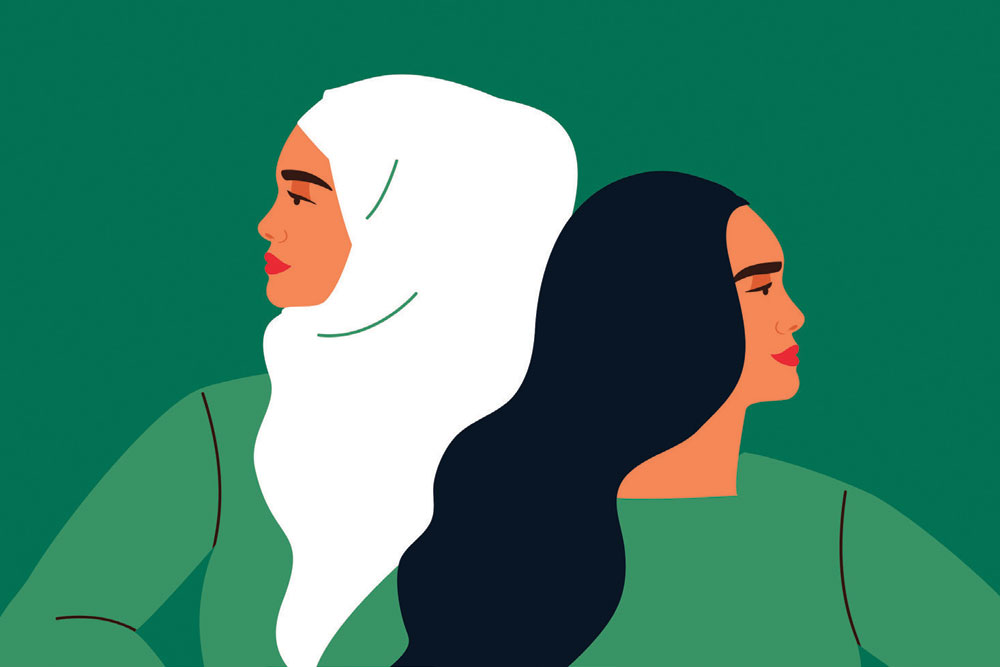
I mean, in many Muslim countries, to learn about the unique political history of each particular nation-state, of whatever area or region of the world that you’re interested in thinking of, knowing that it is unique, knowing that there are circumstances that are unique. And Muslims yes, are 2 billion, today there is really no such thing as Islamic law that might be holding everyone in some sort of unified way of living. I mean, there is only state law. And state law might be inspired by religious law to varying extents depending on what country you’re talking about. Or in the context of European or American Muslims, the extent to which Islam or Muslim ideals or beliefs are governing people’s lifestyle choices varies. And it’s entirely voluntary in that sense because there’s no sponsored version of Islamic law, and not that anyone would want there to be either.
The thing that I would want most would be for people to make themselves aware of the historical context of who they’re talking to and who they’re talking about and learning about, but also being cognizant of how much space they are taking up in a given situation of allyship. So solidarity means not speaking for, but giving voice to. So if you have a platform, using your privilege to give that platform to somebody who doesn’t have a platform to let them speak for themselves. It’s a huge thing that people just don’t know how to do, apparently, and that white feminists have been really guilty of not being able to step out of the spotlight and actually use their privilege to give the microphone to somebody else. And so that’s sort of step one, is to use one’s privilege to uplift other people’s voices. And not in your words, but in their own words. And then to really just learn to listen as opposed to speak out and then ask what would be supportive. What would be a supportive thing to do as opposed to speaking for and presuming what certain things might mean or not mean.
And you know, if hijab is in fact some sort of important issue for someone because that’s what they know or what they think they know, educating themselves on the myriad meanings of hijab is a great place to start. And it certainly has a lot of multiple meanings. I mean, it can signify political power, it can signify spirituality, it can signify empowerment, it can be an expression of modesty, it can be an expression of piety. Not wearing it or wearing it could be a sign of modesty, because wearing it in the context of a place where nobody else wears it is actually standing out. So that’s kind of drawing attention to oneself. Versus not wearing it in a place where everybody’s wearing it is, again, calling attention to oneself. So there are so many interpretations that people have of it, that if that’s even an issue for somebody, then educating yourself on it to begin with and to try to move beyond hijab questions is another thing that would be important.
AA: On that, I just want to throw this in here because it was really enlightening for me, my daughter Lucy pointed out, she’s taking a Middle Eastern history class right now and she read Leila Ahmed’s book, just to your point earlier about imperialism and colonization that many women described that they wear hijab directly in protest of colonization and like, “you think this is bad and you’re judging me?” And it’s a way of showing solidarity with their own culture and claiming pride in their own culture. And they’re aligning themselves with their families, you know what I mean? Rather than some white, judgmental outsider coming in and making a judgment. And I’d never thought of that before, and thought, oh, it’s just too complex. And it made me honestly just want to take a step back and just think, all I want to do from now on is listen, to be honest, and I’m not even interested in the pursuit of having opinions on it. I just want to learn.
ZA: Yeah. I think it’s a very powerful thing to think about the ways in which– and it’s even the structure of this show, right? It’s to think about the ways in which there are in fact overlaps in how people understand gender in Islam and how people understand gender in other religious traditions, and other Abrahamic religious traditions, and keeping that in mind as a foundation to then further question, well, then what happened? Why is it that we have this disconnect? And that disconnect is very much a historical product, and the context of colonialism is in fact integral to learning about what that disconnect looks like and how that carries forward in contemporary times. And how so much of the conversation is, as you already started alluding to, is also race-based. So, most of the Muslims of the world are brown and Black. And even east European Muslims, which are a much smaller percentage of the global Muslim population, but not to assume any particular racial background. There is, however, nonetheless a very racialized component to colonialism, which sort of carries forward in that. And as you said, white women who are coming from non-Muslim backgrounds do carry that racial privilege as well as religious disconnect, or the ways that the Christian mission was bound up in colonialism and how that continues to have a legacy in our contemporary solidarity discourses as well.
AA: Wow. Well, thank you. Thank you for all of that, Dr. Zahra Ayubi. What an honor to have you here today. I’m so grateful for your book, for all of your work, and for joining us today. Thank you so much!
ZA: My pleasure! Thank you so much for having me. I really appreciated this, and thanks for inviting me.
use one’s privilege to uplift other people’s voices

not in your words, but in their own words
Listen to the Episode
&
Share your Comments with us below!



